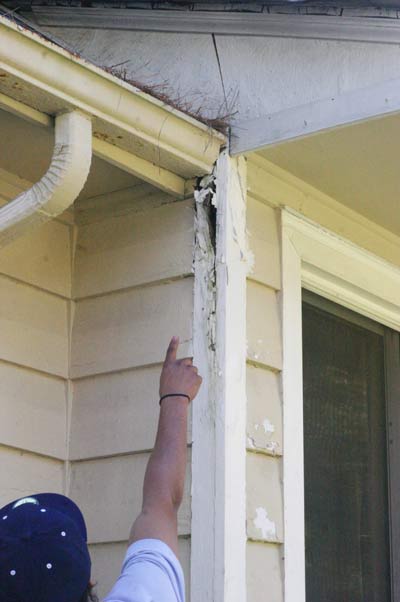by Naundi Armour
NCCU Staff Writer
the Durham VOICE
thedurhamvoice@gmail.com
Northeast Central Durham is going through a restoration thanks to local government and nonprofits, but some local residents remain convinced that it will grind to a halt before achieving its potential.

Rob Graham points out deteriorating conditions typical of a rental home in NECD. (Staff Photo by Naundi Armour)
NECD was once a vibrant community equipped with booming neighborhood business and aesthetically pleasing homes. Now, “the neighborhood just isn’t where it should be,” said local resident, Brittany Marks.
Between the 1970s and the 1990s major industries in NECD closed, resulting in the closing of local businesses and decreased home ownership.
The increase in rental properties and lack of jobs left many in the community unable to support themselves.
Despite the partnerships and initiatives, renovations, additions, and key rehabilitations like the Holton Career and Resource Center, the problems brought about by absentee landlords continues to plague the area.
The biggest problem is undoubtedly homes that fall into disrepair when landlords live far away and don’t make timely repairs to their properties.
Some residents feel that as long as their neighborhood still looks the same, the mindset of the people will stay the same.
“As if it’s already not hard enough to find a job now and pay rent, but the fact that we have to fix everything because our landlords won’t, is what’s keeping my pockets empty,” said a 62-year-old male seasonal worker. “I just won’t do it anymore!”
The 62-year-old, like most other NECD residents, has become the victim of an absentee landlord.
“My bills are sky high because of my windows,” said a 28-year-old mother of two. “Neither the heat nor air will stay in and I asked him to fix it almost five months ago!”
For residents who are having similar issues with their absentee landlords, Constance Stancil, Director of Neighborhood Improvement Services recommends that they call Durham One Call at (919)560-1200.
Durham One Call is a city-run customer service department that answers residents’ questions or directs complaints, concerns, and questions to the proper department. From pot holes and water quality, to issues with a landlord, they promise to respond to issues within 24 hours.
“Many residents are reluctant to complain out of fear that their landlord may retaliate,” said Stancil. “But they can’t do that.”
Despite this assurance, most of the residents interviewed for this story did not want to give their names or addresses out of concern of reprisals.
Nevertheless, because city officials recognize the complications that come from having a high number of absentee landlords in a community, the Neighborhood Improvement Services Department will be implementing a periodic landlord inspection program within the next two months.
The program will list areas of high complaint and proactively identify properties and contact home owners and or renters for an inspection.
“A problem that we see a lot is some absentee landlords don’t have the same interests as someone who is actually living in Durham,” said Stancil. “And when we contact them to tell them what’s going on, some claim they didn’t know and fix the problem, while some others just don’t care.”
Some residents agree with Stancil.
“I just wish they cared. I think if they did, we as residents would care more,” said a 39-year-old grandmother of two. “If the landlords would come and check on the house, maybe some people would feel like they had to keep up their house. I mean the yard, the porch, and the sidewalk.”
According to the 2000 US Census, the demographic makeup of NECD is 75 percent African American and 18 percent Latino. A recent poverty report published by the US Census Bureau, states that the number of African-American households in poverty rose to 27.4 percent, followed by Latino households at 26.6 percent, Asian households at 12.1 percent, and white households at 9.9 percent.
The same reports indicate that NECD contains 2,456 renter occupied housing units and 593 owner-occupied housing units.
Programs such as Preservation Durham and Preservation NC push for more owner occupied housing in NECD, but the process of change is slow.
Weblinks: www.preservationnc.org
www.ci.durham.nc.us/departments/onecall